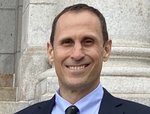

I was talking with my 80-something neighbor the other day while shoveling snow. He’s a veteran who was an engineer in the United States Army and is a wise man. Having lived in Uptown for over five decades, he’s had a front-row seat to our neighborhood history. We were talking about current events and all that’s happening in the world and our city.
“Who even knows what the truth is anymore,” he said.
It got me thinking about the truth. Everything starts with truth. Truth leads to trust, and trust leads to cooperation. With truth, anything is possible.
Without truth, no relationship of any kind can exist. There is nothing to build on. We can never get to trust. If you can’t trust someone, how do you know they are telling the truth? And if we never get to trust, we can never get to collaboration. We can never work together toward a common good. Without truth, what do we have? Division. Suspicions. Prejudices.
Our reality today is filled with deep divisions and a lack of objective truth. There is no consensus. Not on a global scale or the local level. This lack of truth sows uncertainty and doubt. “We’ll know our disinformation program is complete when everything the American public believes is false,” CIA director William J. Casey said in 1981.
We may not be that far gone yet, but we are at a critical crossroads. According to the 2022 Edelman Trust Barometer, government and media have fueled a cycle of distrust, with nearly 50 percent of respondents (36,000+) viewing them as divisive forces in society. Two-thirds (67 percent) of people globally believe journalists purposely try to mislead people. But it’s not just about government and media. There’s also a lack of trust in each other, which is even more troubling. We need a truthtelling process that is centered around restorative practices.
Circle processes, following in the Native American tradition, can help do this work. Circles are a versatile peacemaking and restorative practice. They can bring people together in a proactive way to build community or be used in a reactive way to address wrongdoing and conflicts. There are different kinds of circles, but they all provide people with an opportunity to see, speak and listen from the heart in a safe, respectful environment that promotes equality and transformative growth. They are nothing like the stereotypes some critics project, where everyone holds hands and sings “Kumbaya.”
I participated in my first circle process recently, completing 30 hours of Indigenous restorative practice circle training over four days with the Koinonia Leadership Academy. Led by Dr. Talaya Tolefree and Pastor Darrell Gillespie, our circle was a diverse mix of 15 people with all different backgrounds and lived experiences. Most of us didn’t know each other when we started, but by the end of the week, after an outpouring of truth, we built trust and developed a strong kinship and connection. The circle process was a powerful experience that opened my eyes and heart to the power of circles and their potential uses in communities, schools and other places.
We plan to use the circle process in our community peacebuilding work through LHENA, but it can play an even bigger role in Minneapolis to heal old wounds and resolve longstanding conflicts. It’s time to face painful, violent history in an honest way so the city can move ahead. With circles, we can confront local problems and come to terms with the city’s history of racial terror and violence – police violence and community violence. A truth and reconciliation commission could help stop the violence, forge peace and chart a new path forward. Circles are not a cure-all, but they will be a start.
Fania Davis, a leading national voice on racial and restorative justice, provided a roadmap in her book, “The Little Book of Race and Restorative Justice.” We can look to other places that have used truth and reconciliation commissions to move forward, such as South Africa in 1994 after apartheid, Canada in 2008 to redress human rights violations against aboriginal children, Greensboro (North Carolina) in 2004 to address white supremacist violence and perceived police complicity, and Sierra Leone after their 11-year civil war ended in 2002.
We could adapt these models to create a truth and reconciliation commission that meets our needs in Minneapolis. The community would have ownership of the process and lead the commission, with support from the state, but maintain complete independence. This process would bring together multiple voices –influential community members, police, youth, crime victims, religious and political leaders – for public ceremonies of truthtelling and forgiveness between the parties causing and experiencing harm. It would be facilitated by experts in the restorative process.
A step toward ending the epidemic of violence and rehumanizing all people.
To learn more or get involved, visit bit.ly/mplspublicsafety.
Comments
No comments on this item Please log in to comment by clicking here